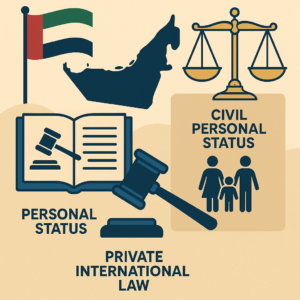Views
The Personal Status Regimes in the UAE — What’s New and What Are the Implications for Private International Law? A Brief Critical Appraisal
 Prologue
Prologue
On 15 April 2025, the new federal UAE law on personal status (Federal Decree Law No 41 of 14 October 2024) officially entered into force ( “2024 PSL”). This law fully replaces the 2005 Federal Act on Personal Status (Federal Law No. 28 of 19 November 2005 as subsequently amended) (“2005 PSL”). The new law marks the latest step in the UAE remarkable wave of legal reforms, particularly regarding personal status matters. It follows a series of significant developments at both the federal and local levels. At the federal level, this includes the adoption of the law on Civil Personal Status (Federal Decree-Law No. 41 of 3 October 2022 on Civil Personal Status) (“2022 CPSL”) and its executive regulation. At the local level, specific legislations were adopted in the Emirate of Abu Dhabi, most notably the 2021 Law on Civil Marriages and its Effects (as subsequently amended) (“2021 ADCML”), and its Procedural Regulation. These legislative efforts collectively address what is commonly referred to as “civil family law” (for further details see previous posts on this blog here, here, here, and here). Together with the new 2024 PSL, these instruments will collectively be referred to as the “Family Law Regulations” (see Table below). Read more
Opinion of AG de la Tour in C-713/23, Trojan: A step forward in the cross-border recognition of same-sex marriages in the EU?
Dr. Carlos Santaló Goris, Postdoctoral researcher at the University of Luxembourg, offers an analysis of the Opinion of Advocate General de la Tour in CJEU, Case C-713/23, Trojan
From Coman to Trojan
On 5 June 2018, the Court of Justice of the European Union (‘CJEU’) rendered its judgment in the case C-673/16, Coman. In this landmark ruling, the CJEU decided that Member States are required to recognize same-sex marriage contracted in another Member Stated to grant a residence permit to the non-EU citizen spouse of an EU citizen under the EU Citizens’ Rights Directive. The pending case C-713/23, Trojan goes a step further than C-673/16, Coman. On this occasion, the CJEU was asked whether EU law requires a civil registry of Poland, a Member State that does not provide any form of recognition to same-sex couples, to transcribe the certificate of same-sex marriage validly contracted in another Member State. A positive answer would imply that the same-sex marriage established under German law would be able to deploy the same effects as a validly contracted marriage under Polish law. While the CJEU has not yet rendered a judgment, on 3 April 2025, Advocate General de la Tour issued his Opinion on the case. While the CJEU might decide differently from AG de la Tour, the Opinion already gives an idea of the solution that might potentially be reached by the CJEU. This post aims to analyse the case and explore its implications should the CJEU side with AG de la Tour. Read more
A New Precedent in Contract Conflicts: Decoding the Tyson v. GIC Ruling on Hierarchy Clauses
By Ryan Joseph, final-year BBA LLB (Hons) student, Jindal Global Law School, India.
Introduction
The recent decision of the UK High Court (“Court”) in Tyson International Company Limited (“Tyson”) v. General Insurance Corporation of India (“GIC”) sets a critical precedent for cases that lie at the intersection of arbitration, contractual hierarchy, and judicial intervention through anti-suit injunctions. The principal issue in the case revolved around the harmonious application of two conflicting dispute resolution clauses contained in two separate agreements pertaining to the same transaction. While one provided for dispute settlement through arbitration seated in New York, the other was an exclusive jurisdiction clause that provided for dispute settlement by England and Wales courts. To resolve this apparent conflict between the two clauses, the Court relied on a confusion clause (also known as a hierarchy clause) in the parties’ agreement to rule that the exclusive jurisdiction clause, in favour of England and Wales courts, prevails over the arbitration clause. Based on this conclusion, the Court issued an anti-suit injunction against GIC from arbitrating the dispute in New York. Read more
News
ASADIP Conference Rio 2025 (report) and San Salvador 2026 date (20-23 October)
 The ASADIP conference is an annual highlight of the discipline. The reports from the 2025 conference in Rio de Janeiro are now available, in English, Spanish, and Portuguese, here
The ASADIP conference is an annual highlight of the discipline. The reports from the 2025 conference in Rio de Janeiro are now available, in English, Spanish, and Portuguese, here
And the location and date for the 2026 have been set for San Salvador, El Salvador, 20-23 October. See you there.
Short report: Conference on Sustainable Global Value Chains and Private International Law
On 17 October 2025, the EBS Law School in Oestrich-Winkel, Germany, hosted a conference Sustainable Global Value Chains and Private International Law. The conference was organised by Professors Veronica Ruiz Abou-Nigm (Edinburgh Law School) and Michael Nietsch (EBS Law School) as part of the Law Schools Global League Sustainable Global Value Chains Project (see also here).
The conference brought together a number of scholars specialised in private international law, company law, and contract law to discuss the role of private law and private international law in social, economic, and environmental sustainability within global value chains.
Keynote
Ralf Michaels (Max Planck Institute for Comparative and International Private Law, Hamburg, Germany) delivered the keynote lecture entitled “European Law for Global Value Chains – Human Rights Advancement or European Imperialism?” Professor Michaels addressed this question from a historical perspective. He related the historical roots of existing sourcing practices to contemporary supply chains, drawing on a wealth of theoretical insights. He further reflected on the conceptualisations that remain necessary for the legal discipline to contribute to addressing economic inequalities in contemporary global sourcing practices facilitated by interconnected chains of contracts.
After the keynote, several scholars provided insights into their current research, which resonated with various aspects of the keynote lecture. Read more
Virtual Workshop (in English) on November 4, 2025: Caroline Sophie Rapatz on “Fly Me to the Moon and Let Me Play Among the Laws?”

On Tuesday, November 4, 2025, the Hamburg Max Planck Institute will host its monthly virtual workshop Current Research in Private International Law at 10:30 a.m. – 12:00 p.m. (CEST). Professor Caroline Sophie Rapatz (Christian-Albrechts-Universität zu Kiel) will speak, in English, about the topic
“Fly Me to the Moon and Let Me Play Among the Laws?”
With the increasing privatisation and economisation of space activities, the need for private space law becomes urgent: Responsible exploration and exploitation necessitates suitable and reliable rules on jurisdiction and applicable law in Outer Space as well as substantive private law adapted specifically to space scenarios. The presentation will explore the options for developing a comprehensive body of such private (international) law rules within the framework established by the existing public international law treaties on space law. It will outline possible approaches to such an undertaking, using property law questions as the main example.
The presentation will be followed by open discussion. All are welcome. More information and sign-up here.
If you want to be invited to these events in the future, please write to veranstaltungen@mpipriv.de.


